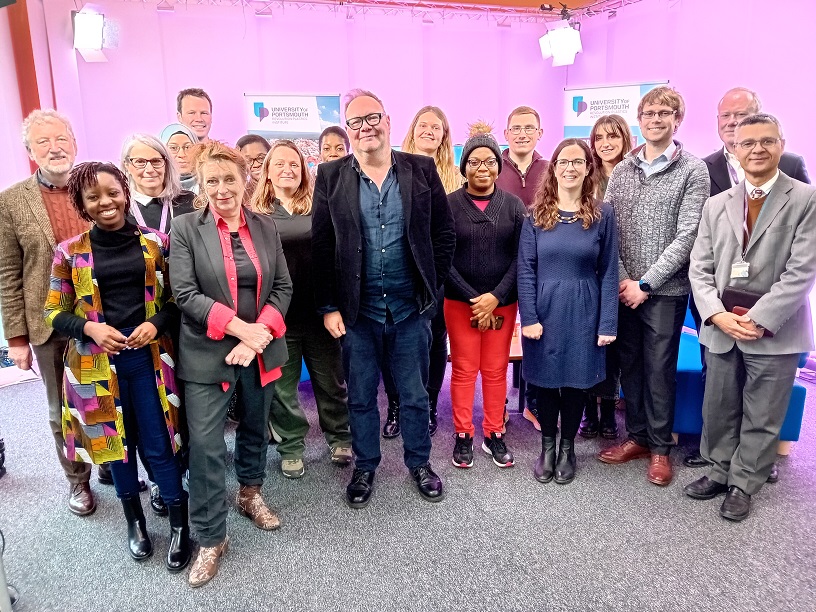Accelerating the fight against global plastic pollution: Launch of the Revolution Plastics Institute
Revolution Plastics Institute
There’s an evolution of a revolution at the University of Portsmouth, with a new development that is poised to reshape how global plastic research takes place
In a major step towards addressing the ever-growing global plastic pollution crisis, the University of Portsmouth has launched the Revolution Plastics Institute. The institute is set to redefine the landscape of plastic research, adopting a transdisciplinary and collaborative approach to find innovative solutions to a problem that has defied conventional strategies.
World-leading experts at the University of Portsmouth believe the global plastic crisis demands more than traditional, monodisciplinary research and isolated technology-based solutions. The Revolution Plastics Institute will adopt an inclusive, solutions-focused strategy, inviting contributions from all disciplines and fostering partnerships within the global plastics community.
Professor Steve Fletcher, Director of the Revolution Plastics Institute said: “Global plastic pollution is getting worse and the launch of the Revolution Plastics Institute elevates our commitment to confront and overcome this pressing challenge.
“The global plastic pollution crisis cannot be tackled through the same approaches that have failed us for the last 30 years. Mono-disciplinary research will not provide the insights needed, nor will relying on technocentric fixes, governments, or industry alone. Our only option is to draw solutions from multiple disciplines and partner with the wider global plastics community.
“Our collaborative, multidisciplinary approach signifies a departure from conventional strategies that have fallen short. The Institute is dedicated to fostering inclusive, solutions-focused research that not only understands the complexities of the global plastics crisis but actively contributes to the urgent transition towards a sustainable plastics future.”
The new Institute is not merely an academic venture. Professor Fletcher summarises “Our mission is clear, to revolutionise our understanding, collaborate globally and lead the way towards a world free from plastic pollution.”
Origins of the Revolution Plastics Institute
The Institute builds on the success of the Revolution Plastics Initiative, which united researchers, business-leaders, campaigners and citizens who share an ambition to transform the way we make, use and dispose of plastics.
Started in 2020, Revolution Plastics has grown into a vibrant community of approximately 100 staff members and 20 PhD students, in addition to external partnerships with academia, industry, NGOs, civic society and policy makers.
The University of Portsmouth has made significant contributions to research into reducing plastic pollution. It has informed national and global policies on plastics, pioneered advanced enzyme recycling techniques, and played a role in discussions surrounding the UN treaty to end plastic pollution.

Global collaboration and recognition
In the past four years, Revolution Plastics has published reports and papers for prestigious organisations such as the World Bank, World Economic Forum, G20, and UNEP. The UK Government has commissioned three plastics policy research projects from the University of Portsmouth.
Approximately 100 plastics-related academic papers and reports from University of Portsmouth researchers have been published in journals such as Nature, the British Medical Journal and Proceedings of the National Academy of Sciences. The Institute is also leading the world's first interdisciplinary plastics-focused journal called Cambridge Prisms: Plastics from Cambridge University Press, with Professor Steve Fletcher serving as the Editor-in-Chief.
The team also convened the UK’s first transdisciplinary plastics conference in June 2023, called PlasticsFuture, hosting over 150 participants, including researchers, industry experts, NGOs and community representatives from around the globe.
Providing an evidence base for a legally-binding plastics treaty
The Institute’s Global Plastics Policy Centre played a key role in co-authoring the UNEP report ‘Turning off the tap: How the world can end plastic pollution and create a circular economy’, published in May 2023, supporting negotiations for a UN global treaty to end plastic pollution.
The University of Portsmouth is recognised as a stakeholder to the UN Environment Assembly, allowing participation in meetings to negotiate the plastics treaty — one of only a handful of universities globally with this status.
In November 2023, the team collaborated with waste pickers from Kenya to deliver a powerful and unique message to policymakers at the beginning of the third round of plastic treaty negotiations in Nairobi. Through a legislative theatre performance, waste pickers brought attention to the challenges they face and advocated for recognition, integration and inclusion in the global treaty process.
High impact areas for plastics research
The Institute will concentrate on three primary focus areas:
Evaluating change across the plastics lifecycle
- Identifying and analysing the shifting characteristics of the global plastics crisis.
- Gathering data on the sources, pathways and impacts of plastic pollution.
- Assessing the environmental, social and human health impacts of plastic pollution.
Socio-economic solutions to reduce plastic pollution
- Evaluating and developing policy measures to reduce plastic pollution.
- Using arts-based participatory methods to engage stakeholders and co-develop solutions.
- Assessing the policy, economic, social and cultural enablers for a sustainable plastics economy.
Innovation and technology for a sustainable plastics future
- Enhancing the role of innovation in addressing the global plastics crisis.
- Pioneering enzymatic plastic recycling technologies.
- Developing new technology, materials, business models, and methods to tackle and monitor plastic pollution.
To find out more please contact Professor Steve Fletcher at steve.fletcher@port.ac.uk
PoliticsHome Newsletters
Get the inside track on what MPs and Peers are talking about. Sign up to The House's morning email for the latest insight and reaction from Parliamentarians, policy-makers and organisations.
